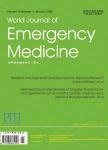版权所有:内蒙古大学图书馆 技术提供:维普资讯• 智图
内蒙古自治区呼和浩特市赛罕区大学西街235号 邮编: 010021

作者机构:Department of Clinical Microbiology and ImmunologyFaculty of MedicineKing Abdulaziz UniversityJeddah 21362Saudi Arabia Special Infectious Agent UnitKing Fahad Medical Research CenterKing Abdulaziz UniversityJeddah 21362Saudi Arabia College of Health and Medical TechnologyMiddle Technical UniversityBaghdad 10047Iraq Department of Medical Laboratory SciencesFaculty of Applied Medical SciencesKing Abdulaziz UniversityJeddah 21362Saudi Arabia
出 版 物:《World Journal of Emergency Medicine》 (世界急诊医学杂志(英文))
年 卷 期:2025年第16卷第1期
页 面:10-17页
核心收录:
学科分类:100218[医学-急诊医学] 1002[医学-临床医学] 1010[医学-医学技术(可授医学、理学学位)] 10[医学]
基 金:funded by the Deanship of Scientific Research (DSR) at King Abdulaziz University Jeddah Saudi Arabia under grant number G-150-248-1443
主 题:Sepsis Bacteria Bottleneck Inflammation
摘 要:BACKGROUND: Sepsis is a life-threatening inflammatory condition in which the invading pathogen avoids the host s defense mechanisms and continuously stimulates and damages host cells. Consequently, many immune responses initially triggered for protection become harmful because of the failure to restore homeostasis, resulting in ongoing hyperinflammation and immunosuppression. METHODS: A literature review was conducted to address bacterial sepsis, describe advances in understanding complex immunological reactions, critically assess diagnostic approaches, and emphasize the importance of studying bacterial bottlenecks in the detection and treatment of ***: Diagnosing sepsis via a single laboratory test is not feasible;therefore, multiple key biomarkers are typically monitored, with a focus on trends rather than absolute values. The immediate interpretation of sepsis-associated clinical signs and symptoms, along with the use of specific and sensitive laboratory tests, is crucial for the survival of patients in the early stages. However, long-term mortality associated with sepsis is now recognized, and alongside the progression of this condition, there is an in vivo selection of adapted ***: Bacterial sepsis remains a significant cause of mortality across all ages and societies. While substantial progress has been made in understanding the immunological mechanisms underlying the inflammatory response, there is growing recognition that the ongoing host-pathogen interactions, including the emergence of adapted virulent strains, shape both the acute and long-term outcomes in sepsis. This underscores the urgent need for novel high-throughput diagnostic methods and a shift toward more pre-emptive, rather than reactive, treatment strategies in sepsis care.